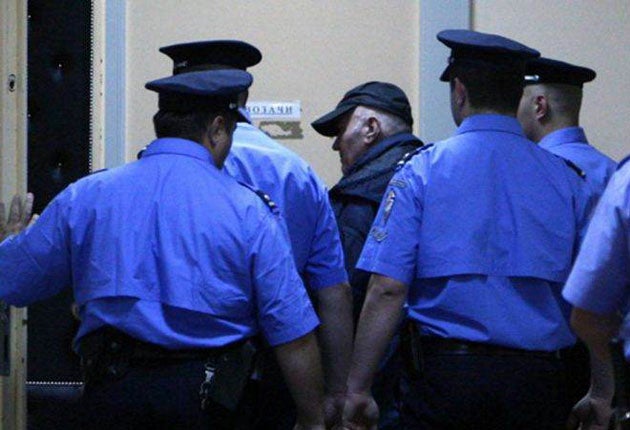Mladic 'too frail to respond to questions' as court hearing begins

A frail Ratko Mladic appeared in a war crimes court last night. The former Bosnian Serb military commander was finally run to ground after a 16-year hunt for the man held responsible for Europe's worst massacre since the Second World War.
Hours after he was arrested at a relative's home at a tiny village in northern Serbia, Mladic, 69, escorted by four guards, walked slowly into a closed session at a Belgrade court in the first stage of the extradition process to The Hague to stand trial.
The judge cut short the questioning because the suspect's "poor physical state" left him unable to communicate, according to Mladic's lawyer.
Milos Saljic said Mladic asserts that he will not answer to the authority of the UN war crimes tribunal in the Netherlands. "He is aware that he is under arrest, he knows where he is and he said he does not recognise The Hague tribunal," Mr Saljic said. The questioning will continue today.
The arrest cleared the single most difficult block to Serbia joining the EU. The country had been treated as a pariah nation following its failure to capture the man wanted for the deaths of 7,000 Muslim men and boys at Srebrenica in 1995, but still hailed as a hero by many of his fellow countrymen for his combative role in the Balkans wars of the 1990s.
"We have ended a difficult period of our history and removed the stain from the face of Serbia and the members of our nation wherever they live," President Boris Tadic said in a triumphant announcement. He said Serbia has begun the process of extraditing the former general to the UN war crimes tribunal in The Hague, where he faces life in prison if convicted of genocide and other charges.
Although the fighting in the region ended in 1995, the shadows of atrocities which were committed in the wars in Croatia and Bosnia – that took up to 150,000 lives, mostly of non-Serbs – have prevented reconciliation, even though the country is in the hands of a generation of leaders who did not take part in the war.
Barack Obama said that Mladic must now answer to his victims in court. He said: "May the families of Mladic's victims find some solace in today's arrest and may this deepen the ties among the people of the region."
Hajra Catic, who heads the association, Mothers of Srebenica, told The Independent from the Bosnian town of Tuzla that "the arrest of Mladic means a lot for us. Nothing can bring back our husbands or sons, but it is good to see that the man who ordered our dear ones to be slaughtered is finally going to face justice".
Mladic is accused of genocide and other crimes against humanity, one of which being the worst atrocity in the Bosnian war, the massacre of more than 7,000 Muslim men and boys from the town of Srebrenica in July 1995. The charges also deal with the three-and-a-half year siege of the Bosnian capital Sarajevo, which left more than 10,000 dead during heavy and indiscriminate shelling of the city.
Along with the political leader of Bosnian Serbs, Radovan Karadzic, Ratko Mladic became a symbol of the Serb campaign of ethnic cleansing in the Bosnian war. Karadzic, who was arrested in Belgrade in July 2008 and is now on trial at The Hague, expressed his "sorrow" at the arrest of Mladic.
However, many Serbs, particularly those who originated from Bosnia, believe that Mladic is a war hero.
A sign reading "Mladic Hero" was posted on the entrance of the village, as police vehicles guarded the house where Mladic was arrested. Officials said that he had two pistols but went quietly when security forces arrived at the house at 5.30am yesterday.
Despite rewards worth millions of pounds for his arrest, he was initially able to live openly in Serbia before going underground, as the authorities came under growing pressure to arrest him.
Serbian police yesterday banned all gatherings and raised security levels throughout the country in case of violent nationalist reaction to the arrest.
The nationalist Serbian Radical Party described the seizure of Mladic as "one of the hardest moments in Serbian history."
Join our commenting forum
Join thought-provoking conversations, follow other Independent readers and see their replies
Comments